
Nuncius-Journal of the History of Science
Scope & Guideline
Decoding the Impact of Science on Society
Introduction
Aims and Scopes
- Interdisciplinary Historical Analysis:
The journal focuses on the historical evolution of science, integrating perspectives from various disciplines such as history, philosophy, sociology, and anthropology. This approach allows for a nuanced understanding of scientific developments. - Cultural Contexts of Science:
Nuncius emphasizes the importance of cultural and geographical contexts in the history of science, exploring how local practices, beliefs, and politics influence scientific knowledge and its dissemination. - Gender Studies in Science:
A significant focus is on the roles of gender in the history of science, examining how women and marginalized groups have contributed to scientific advancements and how their experiences shape scientific narratives. - Material Culture and Scientific Instruments:
The journal investigates the role of material culture, including scientific instruments and collections, in the practice and communication of science, highlighting how objects influence scientific thought and public understanding. - Historical Case Studies:
Nuncius publishes detailed case studies that illustrate specific moments or movements in the history of science, providing insights into the complexities of scientific inquiry and the socio-political environments that shape it.
Trending and Emerging
- Intersection of Science and Gender:
There is an increasing focus on how gender influences scientific practice and knowledge production, as evidenced by numerous recent articles examining women's roles in science and the implications of gendered perspectives. - Cultural Heritage and Science:
Recent publications emphasize the importance of cultural heritage in understanding scientific practices, highlighting how historical artifacts and collections can illuminate scientific narratives and societal values. - Environmental and Medical Histories:
Emerging themes include historical analyses of environmental science and medical practices, reflecting contemporary concerns about health and ecology, and how these intersect with historical developments. - Science and Colonialism:
There is a growing interest in the relationship between science and colonialism, exploring how imperial contexts shaped scientific knowledge and practices, particularly in the Global South. - Visual Culture in Science:
The journal is increasingly publishing works that analyze the role of visual culture in the dissemination and understanding of scientific ideas, recognizing the impact of images and visual representations in shaping public perceptions of science.
Declining or Waning
- Traditional Scientific Biography:
There has been a noticeable decrease in papers focusing solely on the biographical details of famous scientists, suggesting a shift towards broader thematic explorations that place scientific figures within larger socio-cultural contexts. - Purely Technical Studies of Instruments:
Studies centered exclusively on the technical specifications and functions of scientific instruments are becoming less common, as the journal increasingly favors investigations that place these instruments within a historical narrative or cultural framework. - Eurocentric Perspectives:
The journal appears to be moving away from Eurocentric narratives of scientific history, reflecting a growing interest in global perspectives and the contributions of non-Western cultures to scientific knowledge. - Static Historical Narratives:
There is a decline in articles that present static or linear historical narratives, with a preference for dynamic analyses that consider the complexities and interconnections of scientific developments across different eras.
Similar Journals

History of Geo- and Space Sciences
Fostering interdisciplinary dialogue in Earth and space exploration.History of Geo- and Space Sciences is a distinguished open-access journal published by COPERNICUS GESELLSCHAFT MBH since 2010, committed to advancing knowledge in the interdisciplinary fields of Earth and planetary sciences as well as the history and philosophy of science. Based in Germany, this journal operates under ISSN 2190-5010 and E-ISSN 2190-5029, providing a platform for researchers, professionals, and students to disseminate and access high-quality scholarly articles. With a remarkable impact reflected in its 2023 Scopus rankings, placing it in Q3 for Earth and Planetary Sciences (miscellaneous) and Q2 for History and Philosophy of Science, the journal plays a crucial role in fostering dialogue and collaboration among the scientific community. It not only covers significant advancements in geo-sciences but also addresses historical perspectives and philosophical inquiries that shape our understanding of the discipline. Engage with groundbreaking research and broaden your insights by contributing to or reading articles from this pivotal journal.
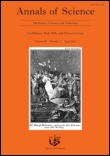
ANNALS OF SCIENCE
Exploring the Intersection of Science and PhilosophyANNALS OF SCIENCE, published by Taylor & Francis Ltd, is a pivotal journal in the field of the History and Philosophy of Science, as evidenced by its Q3 categorization and a respectable Scopus rank of 99 out of 223, placing it in the 55th percentile among its peers. With a rich history dating back to its initial publication in 1936, the journal has made significant contributions to scholarly discourse, providing a platform for researchers and academics to explore the intricate connections between scientific developments and philosophical inquiries. The journal's commitment to rigorous academic research ensures that it remains a vital resource for professionals, educators, and students dedicated to understanding the evolution of scientific thought. Although it operates under traditional subscription models, the journal's importance in shaping modern scientific discussions cannot be overstated, making it an essential read for those engaged in the multifaceted study of science's history and philosophical implications.

European Journal for Philosophy of Science
Fostering Interdisciplinary Insights in Science and PhilosophyThe European Journal for Philosophy of Science, published by SPRINGER, stands as a prestigious platform for scholars in the realms of philosophy and history of science. With an impressive impact factor and categorized in the Q1 Quartile for both History and Philosophy of Science and Philosophy, this journal ranks among the top 10% of its peers, reinforcing its critical role in advancing academic discussions and insights within these fields. With its composition of rigorous peer-reviewed articles and a commitment to fostering interdisciplinary dialogue, the journal navigates foundational and contemporary issues that shape scientific inquiry. Although currently not Open Access, it provides invaluable access to researchers, professionals, and students who seek to deepen their understanding of the philosophical underpinnings of scientific practice. Housed in the Netherlands, the journal continuously engages with the evolving landscape of philosophy in the scientific domain, making it a key resource for anyone invested in the intersection of science and philosophy.
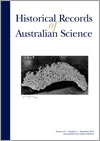
Historical Records of Australian Science
Fostering Interdisciplinary Dialogues in Science History.Historical Records of Australian Science is a premier academic journal published by CSIRO PUBLISHING, focusing on the rich legacy and contributions of Australian science from its inception to contemporary advancements. The journal is integral to the Arts and Humanities and Social Sciences fields, operating within a unique niche that fosters interdisciplinary dialogue and research. With its ISSN 0727-3061 and E-ISSN 1448-5508, it encompasses a diverse scope spanning historical analysis, philosophy of science, demography, and human factors. Although it is currently categorized into Q3 and Q4 quartiles across various relevant spheres in 2023, the journal strives for excellence in archiving pivotal scientific milestones as it continues to publish valuable insights, encouraging submissions from scholars globally. Its commitment to enriching scholarly discussion makes it a crucial resource for researchers, professionals, and students keen on exploring the historical narratives that have shaped Australia’s scientific landscape. With a convergence of knowledge from 1980 through to 2024, the Historical Records of Australian Science stands as a vital repository for those delving into Australia’s scientific heritage.

Journal for General Philosophy of Science
Advancing Critical Thought in the Philosophy of ScienceJournal for General Philosophy of Science, published by Springer, stands as a pivotal resource in the fields of History and Philosophy of Science, as well as general Philosophy. With an impressive Q1 ranking in its categories and a solid reputation reflected in its Scopus rankings, this journal provides a robust platform for scholarly discourse and advancement in philosophical inquiry regarding science. The journal's commitment to quality is evident, catering to researchers, professionals, and students interested in the critical examination of scientific methods, theories, and their implications. While it operates on a subscription basis, the journal is dedicated to fostering a deeper understanding of philosophical issues surrounding scientific practices from 1980 through 2024. Operating out of the picturesque Netherlands, specifically from VAN GODEWIJCKSTRAAT 30, 3311 GZ DORDRECHT, the journal continues to encourage innovative thinking and interdisciplinary dialogue, underscoring its significance in academia today.
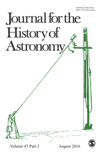
JOURNAL FOR THE HISTORY OF ASTRONOMY
Advancing Understanding of Astronomical NarrativesJournal for the History of Astronomy, published by SAGE Publications Ltd, is a distinguished platform for scholars and enthusiasts interested in the evolution of astronomical thought and practice from 1970 to the present. With its ISSN 0021-8286 and E-ISSN 1753-8556, this journal serves the global academic community by publishing rigorous research and insightful articles that explore the intersection of astronomy with history, philosophy, and culture. Although the journal has a more modest impact factor, as indicated by its Q3 classification in Arts and Humanities and Q4 in Astronomy and Astrophysics, it remains a significant resource for understanding the historical contexts and developments of astronomical science. Researchers can access a wealth of information that contributes to enhancing their understanding of the broader implications of astronomical advancements. The Journal for the History of Astronomy provides a unique forum for examining past contributions to the field, engaging readers who seek to appreciate the legacy and ongoing narrative of astronomy particularly in the United States and beyond.
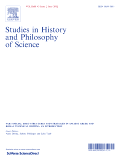
STUDIES IN HISTORY AND PHILOSOPHY OF SCIENCE
Charting the Philosophical Landscape of Scientific ProgressSTUDIES IN HISTORY AND PHILOSOPHY OF SCIENCE, published by Elsevier Science Ltd, is a leading academic journal dedicated to the exploration of historical and philosophical dimensions of science. With both an ISSN of 0039-3681 and E-ISSN of 1879-2510, this esteemed journal has established itself as a pivotal resource since its inception in 1970 and continues to publish cutting-edge research reflecting the evolution of scientific thought. Situated in the United Kingdom, it is recognized for its high-impact contributions, boasting a Q1 ranking in both History and History and Philosophy of Science categories as of 2023. Researchers in the humanities will benefit from the journal’s rigorous analysis and insightful discussions, as evidenced by its competitive Scopus rankings—placing it in the 96th and 83rd percentiles in their respective fields. Although not an open-access journal, it maintains a commitment to scholarly excellence, aiming to foster a deeper understanding of the interconnections between historical context and philosophical inquiry in the scientific domain, making it an invaluable resource for students, professionals, and researchers alike.
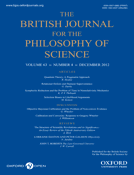
BRITISH JOURNAL FOR THE PHILOSOPHY OF SCIENCE
Advancing Critical Thought in Scientific DiscourseThe British Journal for the Philosophy of Science, published by University of Chicago Press, stands as a leading journal in the fields of philosophy and history of science. With its ISSN 0007-0882 and E-ISSN 1464-3537, this esteemed publication has been pivotal in advancing philosophical discussions surrounding scientific practice since its inception in 1950. Covering a diverse range of topics and critical analyses, it holds an impressive track record within the academic community, consistently achieving Q1 rankings across several categories, including History, Philosophy, and History and Philosophy of Science. With a Scopus rank placing it in the top percentiles of its respective fields, the journal is recognized not only for its academic rigor but also for its role in shaping contemporary philosophical discourse. While it is not an open-access journal, the British Journal for the Philosophy of Science provides essential insights and fosters critical thinking, making it an indispensable resource for researchers, professionals, and students dedicated to the nuanced interplay between science and philosophy.

Sociologia Nauki i Tehnologij-Sociology of Science & Technology
Bridging Disciplines to Illuminate Science and Technology's Role in SocietySociologia Nauki i Tehnologij-Sociology of Science & Technology is a distinguished journal dedicated to exploring the intricate relationships between science, technology, and society. Published by the Institute of History of Science and Technology, Saint Petersburg Branch, Russian Academy of Sciences, this journal serves as a vital platform for interdisciplinary research and discourse within the fields of sociology, science studies, and technology assessment. The journal encourages contributions that delve into the societal implications of scientific advancements and technological innovations, making it essential reading for researchers, professionals, and students alike. Although specific impact factors and access options are currently not provided, the journal is committed to maintaining high academic standards and fostering a rich scholarly community. Join us in advancing the understanding of how science and technology shape human experiences across diverse contexts.

Historical Studies in the Natural Sciences
Illuminating the Intersections of Science, History, and PhilosophyHistorical Studies in the Natural Sciences is a prestigious journal published by University of California Press, dedicated to advancing the understanding and appreciation of the interconnections between natural sciences, history, and philosophy. With an ISSN of 1939-1811 and an E-ISSN of 1939-182X, this journal has established itself as a vital resource for researchers, professionals, and students interested in the historical context and philosophical implications of scientific developments. As of 2023, it holds an impressive Q3 ranking in the category of History and Philosophy of Science and ranks 76th in the Arts and Humanities domain according to Scopus, representing the 65th percentile among peers. The journal spans a convergence of studies from 2008 to 2024, offering insights that bridge gaps between historical perspectives and scientific inquiry. Open access options enhance its accessibility, fostering a broader dialogue within the academic community and beyond. This journal stands as an important platform for scholars aiming to explore the rich tapestry of natural sciences through a historical lens, contributing significantly to the ongoing discourse in the field.